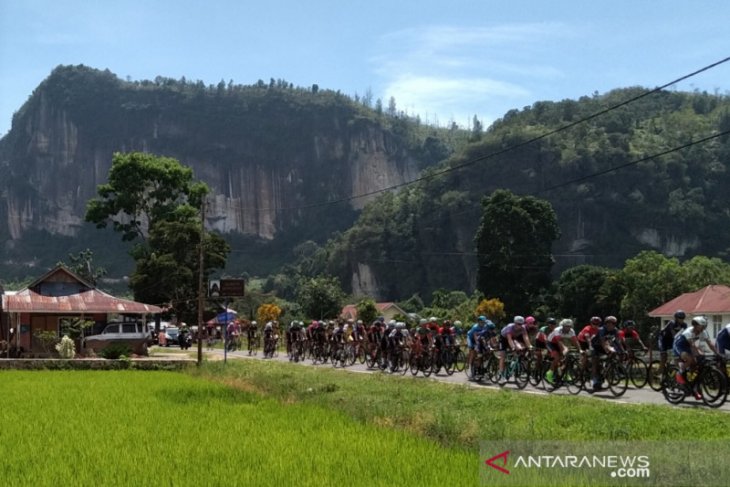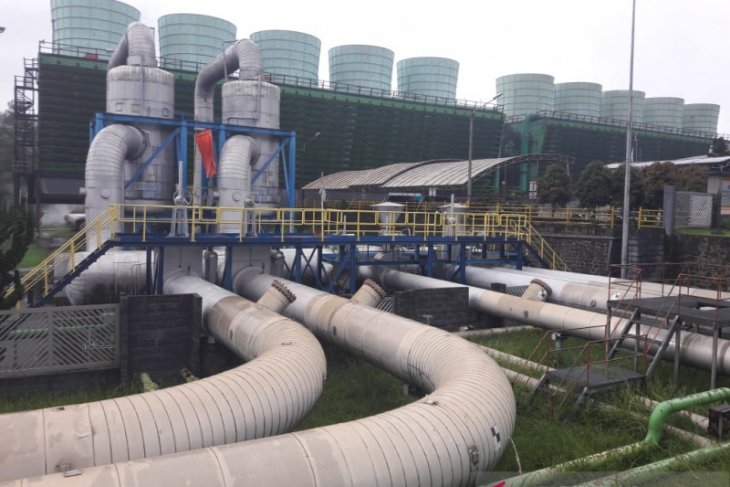Live Streaming
Program Highlight
Company Profile

Ani Hasanah
July

Tour de Singkarak in West Sumatra. (ANTARA/Miko Elfisha)
The 12th edition of Tour de Singkarak (TdS) was canceled this year owing to the COVID-19 pandemic though is planned to be organized next year by involving Sumatra’s provinces of West Sumatra, Jambi, and Riau.
"West Sumatra and Jambi are in it for sure. Now, we are inviting Riau to join. If there is an agreement, TdS XII 2021 will involve the three provinces," Novrial, head of the West Sumatra Tourism Office, stated in Padang, West Sumatra, on Thursday.
The 12th TDS, bearing the tagline "connecting Sumatra," seeks to get more neighboring provinces involved in the sports event aimed at promoting tourism destinations on Sumatra Island.
At a recent meeting of Sumatran governors, an agreement was reached to tap into the opportunity offered by TdS to promote their tourist attractions.
Last February, the West Sumatra tourism office had sent a letter to the Riau tourism office pertaining to invitation to Riau to partake in the TdS event.
The letter was followed by a visit of Taufik Ramadhan, secretary of the West Sumatra Tourism office, and Hendri Agung Indrianto, head of the West Sumatra section, to Pekanbaru, Riau.
Last year, TdS 2019 was organized in West Sumatra and Kerinci District as well as in Sungai Penuh City in neighboring Jambi Province.
The two regions were pleased at the successful implementation of TdS in their regions for the first time and were upbeat about hosting it again next year.
The districts of Bungo and Merangin in Jambi also expressed interest in partaking in organizing the sports event.
"We are optimistic that several districts in Riau would also participate in the TdS 2021 event," he stated.
Drawing inspiration from the two-century-old Tour de France, the TdS was first organized as part of the recovery program following a powerful earthquake that had devastated West Sumatra in 2009 in a bid to boost the tourism industry through a sports-based promotional activity.
TdS has, until now, been viewed as being held successfully. A total of 224 cyclists, grouped in 21 cycling teams from 26 countries, including four domestic teams and one local team, took part in the 2018 TdS. (ANTARA)
July

Geothermal Power Plant (PLTP) Kamojang in Bandung District, West Java, operated by PT Indonesia Power Kamojang Power Generation Operation and Maintenance Services Unit (POMU), a subsidiary of PT PLN. ANTARA/Kelik Dewanto
The Energy and Mineral Resources Ministry has readied a compensation scheme in the form of reimbursement for exploration costs and incentives for the development of geothermal infrastructure to encourage investment in renewable energy in Indonesia.
Taking into account the high risk and investment in the development of environment-friendly geothermal power plants, the ministry has realized the significance of offering some incentive.
The ministry's Director General of Renewable Energy and Energy Conservation, Fx Sutijastoto, noted in a statement in Jakarta on Thursday that the compensation was aimed at ensuring geothermal energy is priced at an affordable level.
"The government has provided incentive and compensation, so the price of renewable energy can be affordable for the public while still being economically feasible for the developer. For instance, in the geothermal sector, to reduce the risk, we provide incentive and compensation, so that PT PLN can offer a better price. We will also provide the exploration costs and tax holidays," Sutijastoto noted.
The ministry projected that the incentive and compensation could press the geothermal energy price lower to some US$2.5-4 cent per kilo Watt hour (kWh).
A regulation on this scheme will be included in the draft of the presidential decree on renewable energy purchasing by state-owned electricity firm PT PLN.
According to Sutijastoto, the ministry will form a team to supervise the process to reimburse the exploration costs that will involve the ministry's Geological Agency and academicians.
The ministry has already received a nod from the Finance Ministry's Fiscal Policy Agency (BKF) to implement the scheme, and the compensation fund will be allocated from the state budget (APBN).
Indonesia has 442 gigawatts (GW) of renewable energy capacity, but merely 10.4 GW, or 2.4 percent, has been installed.
Indonesia has 23.9 GW of geothermal energy potential, and as of May 2020, some 8.17 percent was explored. (ANTARA)
Religious Affairs Minister Fachrul Razi appealed to Indonesian Muslims nationwide to continue to follow preventive measures mandated in the COVID-19 protocols while performing the Idul Adha mass prayer, slaughtering animals, and distributing meat on Friday.
Those visiting mosques and partaking in other Idul Adha mass prayer congregations should also apply social and physical distancing measures in addition to not touching items that may potentially transmit the novel coronavirus disease, he notified journalists in Jakarta on Thursday.
To this end, the tradition of giving infaq, or donation, prior to the mass prayer must also be practiced without touching the charity boxes, he emphasized.
Several mosque administrators had stopped distributing charity boxes to prevent the potential spread of the coronavirus disease among members of the congregation. In its place, they have assigned certain individuals to collect the donations by using bags, he stated.
In the wake of the COVID-19 pandemic situation, Indonesian Muslims living in areas with zero or low number of confirmed COVID-19 cases are allowed to perform the Idul Adha mass prayer at both soccer fields and mosques, he revealed.
However, people living in areas with high number of COVID-19 cases are not allowed to perform the Idul Adha mass prayer on Friday morning, he stated.
This year, Idul Adha, marking the end of the Hajj pilgrimage for Muslims in the holy city of Mecca in Saudi Arabia, is celebrated amid the ongoing COVID-19 pandemic.
During this religious festivity, Muslims in Indonesia sacrifice a goat, sheep, and cow. Their meat is then donated to the poor people and other segments of communities.
Coronavirus infections initially surfaced in the Chinese city of Wuhan at the end of 2019.
Since then, COVID-19 has spread to over 215 countries and territories, including 34 provinces of Indonesia, with a massive spurt in death toll.
The Indonesian government officially confirmed the country's first cases on March 2 this year.
As of July 27, 2020, as many as 43 Indonesian districts and cities had been declared "free from the pandemic", according to the Task Force on COVID-19 Response.
Data from the task force also showed that 66.3 percent or 341 districts and cities had until now recorded less than 100 cases. (ANTARA)



